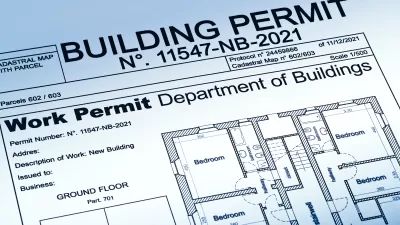Larry Kosmont identifies the fiscal dysfunction driving city resistance to state-mandated density and offers institutional explanations for California’s current housing crisis.

Larry Kosmont, a real estate financing expert and the CEO of Kosmont Companies, identifies the fiscal dysfunction driving municipal resistance to state-mandated density and offers institutional explanations for California’s current housing crisis. Kosmont points to the fiscally constraining effects of Prop 13, ballot-box budgeting, and skyrocketing pension obligations to explain the rock and hard place cities find themselves in today. He points out:
Each city’s annual budget cycle is laden with tough choices and increasing unfunded pension obligations. Collaterally they are being asked, pressured or even told to induce more housing; it’s just a tough choice for them.
Based on the models we used to evaluate the economics of a project, housing doesn’t carry its weight in terms of revenues versus expenditures for the services that it requires, which inevitably drives a solution to build anything but housing. So, housing flunks the fiscal benefits test, and collectively, California flunks its housing delivery needs. Everyone loses out."
Further exacerbated by the dissolution of redevelopment agencies, cities lack the dedicated infrastructure funding and middle-class jobs necessary to realize the benefits of increasing housing supply. Kosmont warns that without strategic solutions targeting middle-class economic development, California housing will remain unaffordable to most.
FULL STORY: Kosmont on the Fiscal Disincentives Undermining Local Approval of Housing Development

Maui's Vacation Rental Debate Turns Ugly
Verbal attacks, misinformation campaigns and fistfights plague a high-stakes debate to convert thousands of vacation rentals into long-term housing.

Planetizen Federal Action Tracker
A weekly monitor of how Trump’s orders and actions are impacting planners and planning in America.

In Urban Planning, AI Prompting Could be the New Design Thinking
Creativity has long been key to great urban design. What if we see AI as our new creative partner?

How Trump's HUD Budget Proposal Would Harm Homelessness Response
Experts say the change to the HUD budget would make it more difficult to identify people who are homeless and connect them with services, and to prevent homelessness.

The Vast Potential of the Right-of-Way
One writer argues that the space between two building faces is the most important element of the built environment.

Florida Seniors Face Rising Homelessness Risk
High housing costs are pushing more seniors, many of them on a fixed income, into homelessness.
Urban Design for Planners 1: Software Tools
This six-course series explores essential urban design concepts using open source software and equips planners with the tools they need to participate fully in the urban design process.
Planning for Universal Design
Learn the tools for implementing Universal Design in planning regulations.
Gallatin County Department of Planning & Community Development
Heyer Gruel & Associates PA
JM Goldson LLC
City of Camden Redevelopment Agency
City of Astoria
Transportation Research & Education Center (TREC) at Portland State University
Jefferson Parish Government
Camden Redevelopment Agency
City of Claremont





























